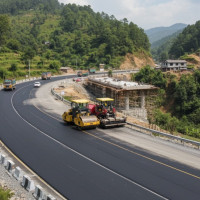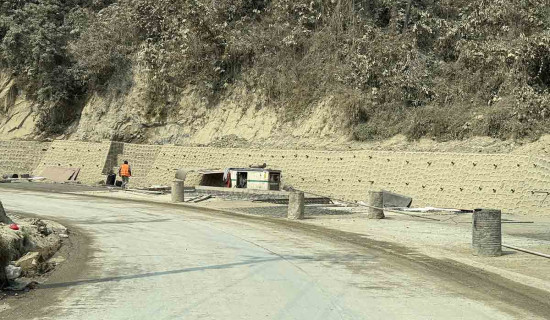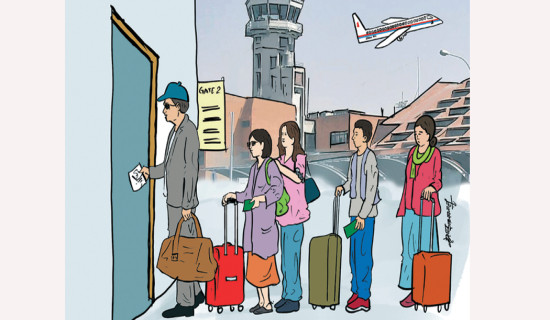- Thursday, 26 February 2026
Govt set to implement parole for prisoners from Oct. 18
Kathmandu, Oct. 12: Following the Cabinet nod on October 3, the government is all set to implement parole system, a reformatory penal procedure, for the first time in Nepal, effective from October 18.
The provision of implementing this scheme has been mentioned in Sub-section 2 of Section 1 of the Criminal Offences (Sentencing and Execution) Act-2017.
Parole is the release of a prisoner temporarily (for a special purpose) or permanently before the completion of his/her jail sentence, on the promise of good behaviour and completing two-thirds of the jail sentence.
Minister for Communication and Information Technology Rekha Sharma, who is also the government spokesperson, said on October 4 that the government used the authority given by the aforementioned legal provision in the Act to introduce the parole system.
Initially, the provision will be enforced by appointing parole officers first in all the prisons of the country. It has been said that the chief jailer will be appointed as parole officer until further arrangement is made.
There are 74 prisons in 72 districts of the country. Of the 77 districts, there are no prisons in five districts – Dhanusha, Bara, Bhaktapur, East Nawalparasi and East Rukum. There are two prisons each in Dang and Kathmandu.
Ram Nayarayan Bidari, former lawmaker and advocate, who worked as the leading expert in introducing the parole system since its drafting period, said that this was an international system and many countries have been practicing this.
"As mentioned in our Criminal Offences (Sentencing and Execution) Act-2017, the parole system implementation decision had been pending for past six years, the government has finally introduced the scheme to be implemented for the Nepali prisoners," said Bidari.
In section 17 (F) of the Act of Matters to be set out in determining sentence, it is mentioned whether the offender can be released on parole or not.
Also, in Section 29 of the Act, it is mentioned that the judge of the District Court may, on the recommendation of the concerned District Probation and Parole Board, make an order to place an offender on parole if he is sentenced to imprisonment for more than one year, and has served two-thirds of the sentence and showed a good conduct.
"But for the time being, the responsibility of recommending for the parole of any prisoner of the District Probation and Parole Board will be given to the Parole Board headed by Attorney General," said Director Kamal Prasad Pandey of the Prison Management. Later, it will be devolved to the district level, he said.
Whether the well-behaved prisoner will be released on parole or not, the decision will be made by the Parole Board which remains under the Attorney General for the time being, later to be taken to the provincial level, said Bidari.
Upon the recommendation of the Parole Board recommendation committee headed by the chief jailer, the list will be taken to the Parole Board led by the Attorney General who will do the needful, said Pandey, spokesperson for the Department of Prison Management (DoPM).
When on parole, the inmate has to check in with the parole officer once a week or more and have an interview, to make sure they have good conduct and have not breached laws, Pandey said.
Once the parole period is completed, the person will be left on their own and put back into society, hopefully not getting into any more trouble with the law. But if a person does not abide by the statutes of the parole, they are immediately sent back to the prison to complete their entire sentence, said Pandey.
The purpose of the parole is to change his/her habits, discipline, behaviour, among others, and bring him/her back to society for socialisation and integrate him/her into the social life. Thus, the parole system is one of the few ways to re-socialise criminals in the society which is a newly developed alternative to the imprisonment system, former parliamentarian Radheshyam Adhikari said.
Bidari also said that prisons of Nepal have become overcrowded and stretched out of capacity. The nation has to spend Rs. 47.5 million every month on their food and daily wages. Every day, every prisoner gets 700 grams of rice and 80 paisa. There are currently 28,093 prisoners across all the prisons, and of them, 1,395 are foreigners.
The Act in Section 29 states that in case of nine different crimes like life imprisonment to any offender, one who has been sentenced for the offence of corruption, rape, human trafficking and transportation, organised crime, money laundering, offence related to torture or cruelty, inhumane or degrading treatment, crime against humanity and the crime against the state, parole will not come into application.



-original-thumb.jpg)


-original-thumb.jpg)










